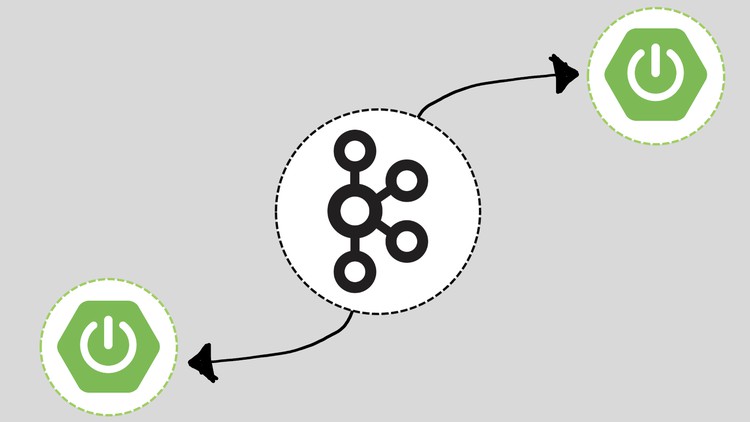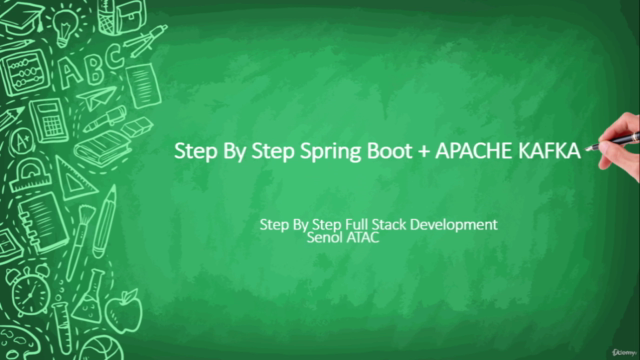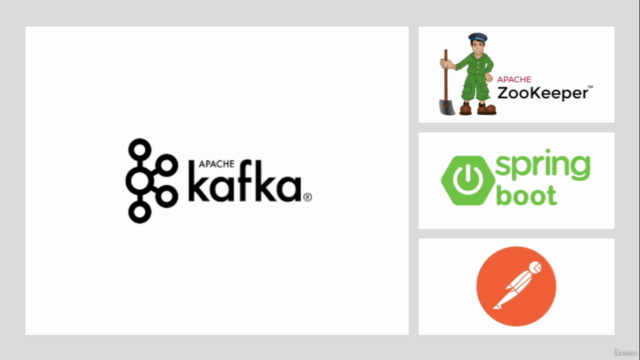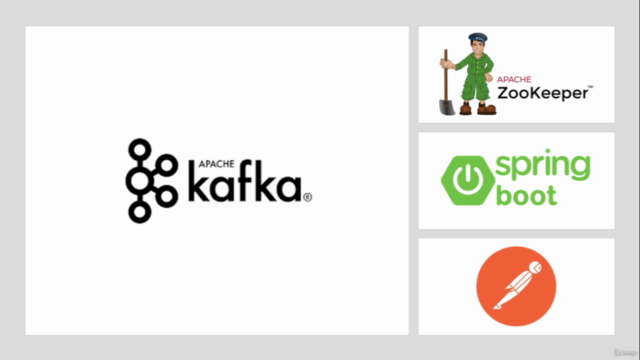Apache Kafka 101 With Java (Spring Boot) For Beginners

Why take this course?
📚 Course Title: Apache Kafka 101 With Java (Spring Boot) For Beginners
🚀 Headline: Master Messaging Systems with Apache Kafka! 🐝
What is Kafka?
Kafka is a robust, distributed Publish/Subscribe messaging system designed to handle large volumes of data and enable real-time processing of streams of data. It's not just for big companies; it's for anyone looking to build scalable and fault-tolerant applications with the ability to process and move humongous amounts of data!
Course Overview:
In this comprehensive course, you will dive deep into the world of Apache Kafka. We will cover everything from the basics to the advanced features using Java and Spring Boot. By the end of this course, you'll be equipped with the knowledge to implement a highly durable message store, understand consumer groups, and tackle real-world data flow challenges. 💧
Key Features of Kafka:
- Scalability: Handles millions of messages per second on a single server. 🚀
- Durability: Data is replicated across the cluster for reliability. 🛡️
- Fault Tolerance: Resistant to node/machine failures within the cluster. ❌🔄✅
- Real-Time Stream Processing: Ability to replay events on demand, unlike traditional brokers. ⏮
Course Highlights:
- Kafka Architecture Explained: Learn how Kafka is structured and how it maintains a distributed data bus.
- Setting Up Your First Kafka Topic: Get hands-on experience with creating topics, producers, and consumers.
- Consumer Groups: Understand the coordination between different nodes in a cluster and how to balance message consumption.
- Kafka & Java (Spring Boot): Integrate Kafka with Java using Spring Boot to build robust applications.
- Understanding Kafka's Retention Policy: Learn how Kafka stores data and how you can manage it.
- Monitoring and Maintenance: Gain insights into the tools and practices for maintaining your Kafka cluster.
Course Structure:
- Introduction to Apache Kafka: What is Kafka, its use cases, and its place in the ecosystem.
- Kafka Components & Terminology: Familiarize yourself with the key concepts like topics, partitions, producers, consumers, and consumer groups.
- Setting Up Your Development Environment: Configure your local setup for Kafka using Spring Boot.
- Producing and Consuming Messages: Understand how to produce and consume messages in Kafka and manage message flow.
- Kafka Internals: Dive into the internal working of Kafka, including data replication and retention policies.
- Scaling Kafka Clusters: Learn how to scale your Kafka deployment for high availability and performance.
- Best Practices for Using Kafka: Tips and tricks for optimal performance and maintaining a healthy Kafka cluster.
- Advanced Topics (Pun Intended!): Explore more complex scenarios like message routing, handling large messages, and strategies to mitigate compression issues.
- Real-World Use Cases: See how Kafka is used in various scenarios and learn from real-world examples.
- Frequently Asked Questions (FAQs): Address common doubts and queries about Kafka.
Why Choose Kafka?
Kafka is designed to be a durable message store, with the ability to replay events on demand. It's perfect for scenarios where you need to process streams of data in real-time and maintain a high level of durability and fault tolerance. It's no wonder that Kafka has become the go-to choice for many companies handling massive data flows.
Potential Drawbacks:
While Kafka is feature-rich, it does have some challenges:
- Complexity: Kafka can be complex to set up and configure compared to other messaging systems.
- Monitoring Tools: The ecosystem lacks a complete suite of monitoring and management tools out-of-the-box.
- Dependent on Zookeeper: Although efforts are underway to reduce this dependency, Kafka currently relies on Apache Zookeeper for coordination.
- Message Compression: High message volumes can lead to compression, which might affect performance and throughput.
- Routing Capabilities: While Kafka offers basic routing, it may not match the advanced routing capabilities of other messaging systems like RabbitMQ.
Who Should Take This Course?
This course is ideal for:
- Developers: If you're looking to build scalable and fault-tolerant applications, understand Kafka's workings, or enhance your Java/Spring Boot skills.
- DevOps Engineers: To manage and maintain Kafka clusters efficiently.
- Data Scientists and Analysts: For those who need to process large streams of data in real-time for analysis or machine learning applications.
- System Architects: Understand the intricacies of integrating Kafka into your system architecture.
Conclusion:
Embark on a journey to master Apache Kafka with Java and Spring Boot. This course will prepare you for the complexities and challenges of real-time data processing in the modern world. Enroll now and transform the way you handle data streams! 🌊🚀
Join us to unlock the full potential of your data with Apache Kafka, and take your skills to the next level! Sign up today and become a Kafka expert.
Course Gallery




Loading charts...